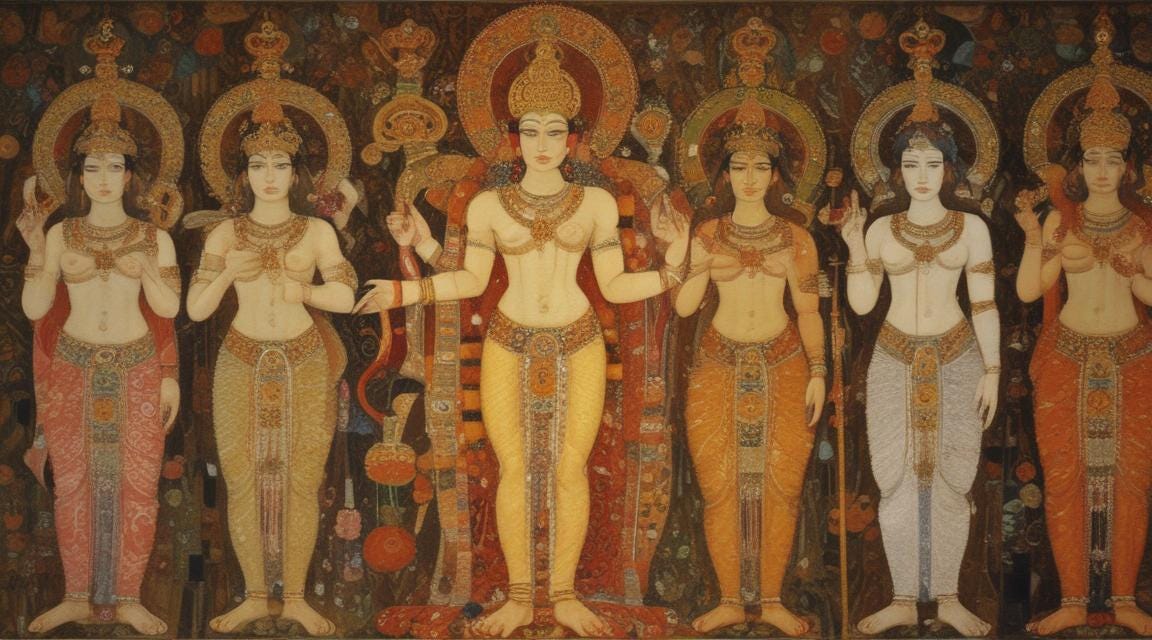27 Moons Project: Uttarāṣāḍha Nakshatra
...the key to understanding your mind and the mind of others
In Vedic astrology, the moon is divided into 27 divisions called Nakshatra. The moon is our mind and therefore how we filter all thoughts, impressions and experiences. Knowing our Moon Nakshatra and the Nakshatras of others is key to understanding and appreciating how we think and approach the world. If you don’t know your Nakshatra, you can find out what it is here.Happy Moon Monday!
For the next half a year (or however long it takes), I’ll be writing a post about the current Nakshatra of the moon every Monday, the day naturally ruled by the moon.
If you don’t know what Nakshatra are, check out this post first.
For now, let’s dive into the Nakshatra the moon is currently in this lovely Monday.
This Monday’s Nakshatra: Uttarāṣāḍha
Uttarāṣāḍhā Nakshatra is the twenty-first Nakshatra in the Vedic lunar zodiac, ranging from 26°40' Sagittarius to 10°00' Capricorn. It is governed by the Sun.
The term Uttarāṣāḍhā translates to “later victorious one,” highlighting this Nakshatra's themes of triumph, perseverance, and ultimate success. It is pronounced “Oo-tuh-rah Ah-shah-dah.”
Uttarāṣāḍhā is marked by four stars, Sigma Sagittarii, Tau Sagittarii, Phi Sagittarii, and Zeta Sagittarii, representing the invincible nature and the enduring qualities associated with this Nakshatra.
To understand the psyche of individuals with their moon in Uttarāṣāḍhā Nakshatra, let's delve into its symbols, deity, and overarching themes.
Symbols

Uttarāṣāḍhā has two main symbols. The first is small bed or the slats of a bed. This bed would also definitely be simple and sturdy, as Uttarāṣāḍhā natives are modest, humble and reliable by nature. No bling or extra pomp and circumstance for these folks!

Another symbol for Uttarāṣāḍhā Nakshatra are elephant tusks. This can speak to the rigid nature these natives sometimes exhibit – they’re generally people who look to the past and tradition for answers. Although pioneering, those with their moon in Uttarāṣāḍhā Nakshatra tend to frown on disruption to the status quo.
Ivory is also opaque and difficult to penetrate. Because they are mild-mannered and prefer simplicity in terms of style and expression, it can be difficult to figure out what these natives are all about. However, don’t let this fool you: They are adept at getting ahead and networking effectively in a polite, respectful way.
Ruling deity
The presiding deities for Uttarāṣāḍhā Nakshatra are the Viśvedevas. The Viśvedevas are a group of deities representing the universal principles and moral values that uphold cosmic order. They are revered for their collective attributes of righteousness, virtue, and goodness.
The Viśvedevas embody the ideals of truth, justice, and integrity, serving as guardians of dharma (cosmic law). They are depicted as a group of radiant, divine beings who work together harmoniously to ensure the stability and prosperity of the universe.
The influence of the Viśvedevas bestows blessings of moral strength, ethical conduct, and a sense of duty on those born under Uttarāṣāḍhā Nakshatra. Individuals with their moon in Uttarāṣāḍhā often exhibit a strong commitment to righteousness and a deep sense of responsibility towards their community and society. They strive to uphold high moral standards and work towards the betterment of humanity.
Just as the Viśvedevas collaborate to maintain cosmic order, natives of Uttarāṣāḍhā Nakshatra are often inclined towards teamwork and collective efforts in their pursuits. They possess a natural inclination towards leadership, governance, and social service, embodying the qualities of the Viśvedevas in their dedication to justice and ethical principles.
Skills and interests

Straightforward, reliable and sincere, Uttarāṣāḍhā natives are people with steady opinions and steadfast principles. They often take on responsibility and work at an early age and are hard workers skilled at making sound decisions.
Although trustworthy themselves, those with their moon in Uttarāṣāḍhā may sometimes have difficulty opening up and trusting others. These natives may not be loud or flashy, but that does not mean they prefer to go unnoticed. They seek praise for all their hard work and will quickly become unhappy if they are not receiving recognition from others.

Because of they are naturally soft-spoken and kind, people may sometimes try to take advantage of them or treat them like a doormat. However, these are focused, driven people who persevere in the end, with a supportive network of friends and colleagues.
Natural born teachers, these people are often skilled at guiding others and taking on leadership positions that call for a pragmatic and solution-oriented mindset.
Strengths and weaknesses
Strengths
dependable and fair
love of history and tradition
knowledgeable and good-natured
natural teacher and leader
goal-oriented and hard-working
level-headed and sincere
work for the greater good and social justice
well liked by others
Weaknesses
can fall pray to false flattery
can develop a helper complex
overly gullible, which may lead to others taking advantage of them
stubborn and resistant to change
issues with stress and anxiety
workaholic tendencies
tendency to bear the weight of the world on their shoulders
Famous people with their moon in Uttarāṣāḍhā
George Washington
Abraham Lincoln
Brad Pitt
George Clooney
Ashley Judd
Cary Grant
Susan Sarandon
Michelle R. Dean is a Vedic astrologer and writer based in Berlin. To find out more about Michelle or book a Vedic astrology consultation, swing by here.



